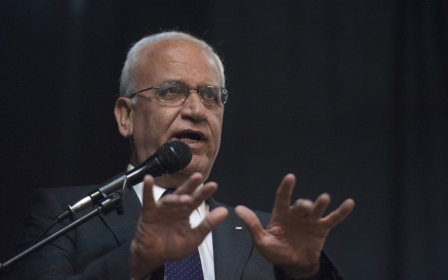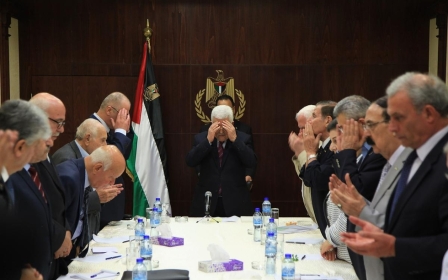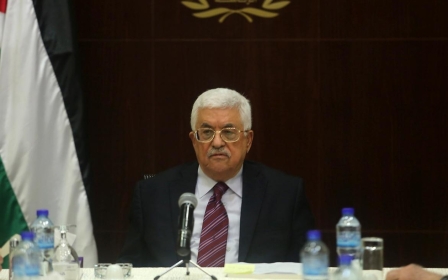Abbas says Palestinians won't abide by Israeli agreements

Palestinian Authority President Mahmoud Abbas had promised that his speech at the UN General Assembly on Wednesday would be a “bombshell”, but his declaration that the Palestinian government will no longer uphold agreements signed under the Oslo Accords fell flat, say analysts.
"The continuation of the status quo is unacceptable because it means giving in to the logic of brutal force being inflicted by the Israeli government," Abbas said, echoing previous speeches he has made to the UN. "We therefore declare that we cannot continue to be bound by these agreements with Israel."
In his speech, Abbas also repeated his promise that the PA will pursue Israel in the International Criminal Court for committing war crimes, comments likely to be met with some doubt from the Palestinian public given the PA's blocking of a legal application to the ICC in August 2014, during the Israeli offensive on the Gaza Strip.
Abbas' declaration was vague and it wasn't immediately clear whether he meant the Palestinians would bring an end to the Oslo Accords which formed the PA in 1993. But Abbas has called on Israel to "assume fully all its responsibilities as an occupying power," describing the current situation as "unsustainable".
After the speech, Abbas, alongside UN secretary-general Ban Ki-moon, presided over a 15-minute ceremony which saw see the symbolic raising of the Palestinian flag for the first time at the UN.
Israeli Prime Minister Benjamin Netanyahu, who will speak at the the UN General Assembly on Thursday, slammed Abbas's speech.
"Abu Mazen's speech is deceitful and encourages incitement and destruction in the Middle East," Netanyahu's office said in a statement, using Abbas' nickname.
Many commentators were quick to criticise Abbas for a speech that they described as lacking hard promises.
Hamas issued a statement calling on Abbas to end security coordination with Israel and for the PA to release all political prisoners in the West Bank.
"Abbas's announcement that the PA will not adhere to the agreements by the Zionist enemy is the demand of the entire Palestinian people, but this announcement must have some credit on the ground, and to be decisive in line with the hope of the Palestinian people and their suffering," the statement said.
Ahead of the speech, analysts guessed that the octogenarian would announce the end of security coordination with Israel, a policy that has cemented his notorious legacy in cracking down on Palestinian activists and dissidents. While many Palestinians consider security coordination to be a form of collaboration, Abbas has previously only used the threat of ending it as political leverage against Israel.
In his opinion piece for the Huffington Post, Abbas urged the international community to “seize the momentum from this symbolic gesture and provide a clear plan to end the illegal Israeli occupation, uphold human rights and achieve justice".
Yet while Abbas hopes for a Security Council resolution within a specific time frame that would demand an end to Israel’s occupation and for a state to be established on the 1967 borders, momentum for such aspirations - which followed through successes in previous years such as declaring Palestine as an observer state - has faltered amidst the ongoing international focus on Syria and dealing with the Islamic State group.
The speech follows a turbulent time inside the occupied territories, where escalating clashes between Jewish settlers - under the protection of Israeli security forces - and Palestinians at the Al-Aqsa Mosque compound in East Jerusalem have become more frequent, sparking fears of another uprising.
The Palestinian Authority is also potentially on the brink of momentous change, after Abbas and several other leading figures resigned from the executive committee of the Palestinian Liberation Organisation (PLO) in August.
Chief negotiator Saeb Erekat recently told the Middle East Eye that the purpose of these resignations was to convene the Palestinian National Council (PNC), the highest body of the PLO which has not met in nearly two decades.
In the MEE interview, Erekat described Abbas as the “father of the Palestinian national movement,” adding that the resignations and convening the PNC - postponed until the end of this year - were “realistic” moves on the president’s part.
“He’s saying, ‘I’m 80. I cannot leave a vacuum behind me. I need to have the institutions behind. I need a new reserve committee with the PLO behind me,’” Erekat said, referring to Abbas.
Middle East Eye propose une couverture et une analyse indépendantes et incomparables du Moyen-Orient, de l’Afrique du Nord et d’autres régions du monde. Pour en savoir plus sur la reprise de ce contenu et les frais qui s’appliquent, veuillez remplir ce formulaire [en anglais]. Pour en savoir plus sur MEE, cliquez ici [en anglais].




